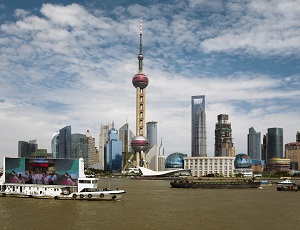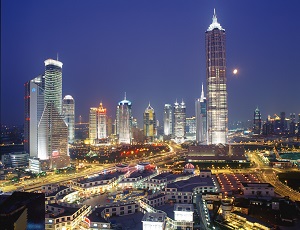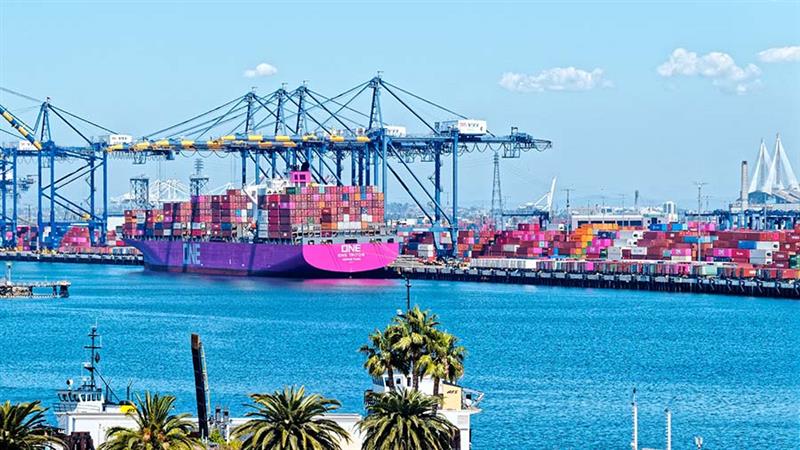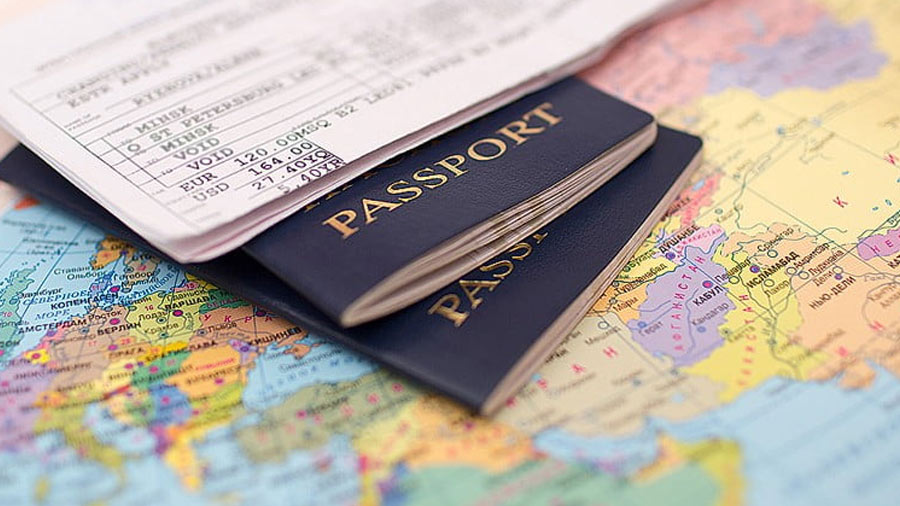Shanghai: The Economic Nexus of China

With a population of over 25 million, Shanghai, often referred to as the “Paris of the east,” is the economic nexus of China. Situated in the Yangtze River Delta (YRD) in east China, the city aims to be the world’s global financial and economic center and international transport hub by 2020.
In this article, Rainy Yao from Dezan Shira & Associates takes a closer look at this modern metropolis with its well-developed infrastructure and sound investment environment.
Economic overview
Shanghai accounts for one-eighth of China’s total financial income while taking up only 0.06 percent of the nation’s land. In 2013, the city’s gross domestic product (GDP) exceeded RMB 2.16 trillion, the highest in all of China. Of this total, the city’s primary industry contributed RMB 12.9 billion and its secondary industry RMB 802.7 billion (up 6.1 percent from 2012). The most notable contribution was from the service sector – a monumental RMB 1.34 trillion, or 62.2 percent of total GDP. In the first half of 2014, the city’s GDP stood at RMB 1.09 trillion with a stable annual growth rate of 7.1 percent.
The finance sector has also played a key role in Shanghai’s economic development, with an added-value in 2013 of RMB 282.3 billion (up 13.7 percent from 2012). By the end of 2013, 215 foreign-invested financial institutions and 198 representative offices had been established in the city.
From January to September 2014, Shanghai has witnessed a sharp increase in foreign direct investment. Over 400 foreign-invested projects were introduced in September alone – a y-o-y growth rate of 34.1 percent.
![]() RELATED: Choosing an Office Location in Shanghai
RELATED: Choosing an Office Location in Shanghai
Development Zones
There are seven national-level development zones in Shanghai, including:
Caohejing Hi-tech Park
In 1991, Caohejing New Technology Park was upgraded by the State Council to Caohejing Hi-tech Park (CHJ). Aimed at becoming China’s answer to Silicon Valley, the park is designated for high-tech enterprises. CHJ owns eight special zones in the YRD region that provide incentive packages for a diverse range of clients with varying requirements. Major industries include microelectronics, photoelectrons, software and new materials.
Lujiazui Finance and Trade Zone
Approved in 1990, Lujiazui Finance and Trade Zone is the first of its kind in China. Designed to bolster the finance, insurance and trade sectors, the Lujiazui region is home to several major multinational corporations such as Siemens and Alcatel.
Zhangjiang Hi-tech Park
Zhangjiang Hi-tech Park is a national-level industrial development zone established in 1992. After years of accelerated growth, Zhangjiang gradually established its own innovative industrial clusters, focusing on areas such as integrated circuits, bio-tech & pharmaceuticals, software and innovation. By the end of 2010, the park was home to more than 6000 enterprises and total revenue stood at some RMB 102.1 billion.
![]() RELATED: Logistics in the Shanghai Free Trade Zone
RELATED: Logistics in the Shanghai Free Trade Zone
 Investment Opportunities
Investment Opportunities
In order to attract foreign investment and multinational headquarters, Shanghai provides various preferential policies such as tax incentives and rental subsidies. Enterprises are highly encouraged to invest in the ‘cultural and creative’ industry, high-end equipment manufacturing and environmental protection. Moreover, Shanghai has been chosen as the site of the BRICS (Brazil, Russia, India, China and South Africa) New Development Bank (NDB), providing even more opportunity for investment in the finance industry.
Preferential Policies for Multinational Headquarters
In July 2014, the Shanghai Government launched a so-called “Quasi-HQ Policy,” aimed at relaxing the requirements for MNCs to establish a regional headquarters. Under the new policy, eligible wholly foreign-owned enterprises (WFOEs) and their branches can still enjoy the preferential policies offered to MNC headquarters, even if not qualifying as such, as long as they meet certain criteria including number of staff, total assets and office space.
Newly-registered investment holding companies and management companies identified as regional HQs can receive start-up and rental subsidies. Additionally, regional HQs that have made a prominent contribution to local economic development will receive bonuses. The city also offers financial support to encourage MNCs to upgrade their existing regional HQs to pan-Asia, pan-Asia-Pacific or global HQs. Other incentives on offer include easier customs clearance, simplified entry/exit formalities and simplified employment permit formalities.
![]() RELATED: Shanghai Raises the Stakes to Attract Multinational Headquarters
RELATED: Shanghai Raises the Stakes to Attract Multinational Headquarters
Shanghai Free Trade Zone (FTZ)
The Shanghai Free Trade Zone (FTZ), officially approved in 2013, is a testing ground for market reforms and the smoother facilitation of foreign investment into China. Altogether, the FTZ consists of the Waigaoqiao Free-Trade Zone, Waigaoqiao Bonded Logistics Park, Yangshan Bonded Port Area and Pudong Airport Comprehensive Bonded Zone. Importantly, the zone adopts a “Negative List” approach to FDI restrictions, under which foreign investors enjoy equal treatment as Chinese domestic enterprises in any industry not explicitly restricted or prohibited on the list.
To unburden investors from China’s tedious administrative approval procedures, the FTZ has established a unique “one-stop application processing platform” for corporate establishment. This means applicants can obtain all necessary documents for company establishment in one place, significantly reducing the time taken to establish a company in the zone. Also, the Shanghai FTZ administrative committee has recently announced that the negative list will be further simplified to meet the needs of foreign investors.
By September 15th of this year, 1,677 foreign-invested enterprises (FIEs) had been established in the FTZ, accounting for 13.7 percent of the total number of enterprises in the zone. By comparison, by the end of 2013, only 228 FIEs had been set up in the zone, with a total registered capital of US$980 million.
|
Asia Briefing Ltd. is a subsidiary of Dezan Shira & Associates. Dezan Shira is a specialist foreign direct investment practice, providing corporate establishment, business advisory, tax advisory and compliance, accounting, payroll, due diligence and financial review services to multinationals investing in China, Hong Kong, India, Vietnam, Singapore and the rest of ASEAN. For further information, please email china@dezshira.com or visit www.dezshira.com. Stay up to date with the latest business and investment trends in Asia by subscribing to our complimentary update service featuring news, commentary and regulatory insight.
|
![]()
 Revisiting the Shanghai Free Trade Zone: A Year of Reforms
Revisiting the Shanghai Free Trade Zone: A Year of Reforms
In this issue of China Briefing, we revisit the Shanghai FTZ and its preferential environment for foreign investment. In the first three articles, we highlight the many changes that have been introduced in the Zone’s first year of operations, including the 2014 Revised Negative List, as well as new measures relating to alternative dispute resolution, cash pooling, and logistics. Lastly, we include a case study of a foreign company successfully utilizing the Shanghai FTZ to access the Outbound Tourism Industry.
 Guide to the Shanghai Free Trade Zone
Guide to the Shanghai Free Trade Zone
In this issue of China Briefing, we introduce the simplified company establishment procedure unique to the zone and the loosening of capital requirements to be applied nation wide this March. Further, we cover the requirements for setting up a business in the medical, e-commerce, value-added telecommunications, shipping, and banking & finance industries in the zone. We hope this will help you better gauge opportunities in the zone for your particular business.
 Industry Specific Licenses and Certifications in China
Industry Specific Licenses and Certifications in China
In this issue of China Briefing, we provide an overview of the licensing schemes for industrial products; food production, distribution and catering services; and advertising. We also introduce two important types of certification in China: the CCC and the China Energy Label (CEL). This issue will provide you with an understanding of the requirements for selling your products or services in China.
- Previous Article China Outbound: Connecting Your China Business to the ASEAN Region
- Next Article Beijing-Promoted FTAAP Will Delay TPP, Driving US Companies to ASEAN for FTA Benefits



























